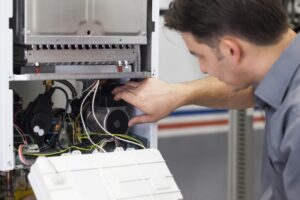We often emphasize just how critical it is to have your heating system maintained annually. It improves the efficiency of your heater, decreases wear and tear on the system, reduces the likelihood that you’ll require repairs, helps your heater live for many more years than it would if it were neglected, and ensures that your heater can continue to operate safely without posing risks such as carbon monoxide poisoning.
What we don’t discuss as often is the actual maintenance process. Because we believe that well-informed customers are better able to make good decisions about their heating systems, we’d like to provide some more detailed information. Here are the main steps that your heating technician will perform during regular annual maintenance, with the caveat that gas and electric heaters do require some different steps.
Dust
The interior of your furnace cabinet and components including the blower motor, the flame sensor, and the pilot assembly will be thoroughly cleaned. The dust that builds up in there can cause a lot of problems, such as a dirty flame sensor failing to recognize that the pilot light is on. Your technician will also change the furnace’s air filter, although this is a job you should be doing yourself every 1–3 months.
Electrical Components
It’s critical to inspect and test all electrical components and every electrical connection in your heater. If a wire is a little bit loose, and your technician tightens it during maintenance, it won’t continue to loosen until it comes undone and requires repair. It’s also a matter of safety. Tests will also be performed to make sure the capacitors and thermostat are correctly calibrated and operating effectively.
Moving Parts
Some of the parts of your furnace, like the blower motor and fans, spend most of their time being in motion. And moving parts build up a lot of friction. To prevent that from causing wear and tear, or even overheating and causing the whole furnace to shut down, your technician will meticulously lubricate all those moving parts.
Safety Considerations
These differ significantly depending on whether your furnace is powered with electricity or is gas-burning. Since we’ve covered electrical parts (because both types of furnace do have some electrical parts), we’ll mention gas-specific safety considerations here. Most important among these are inspecting for any sign of fuel leakage, testing to confirm that the fuel is combusting completely, and testing the CO detector.
Communication
You should always feel free to ask your heating technician about anything to do with heating in Buford, GA. We’re proud to share our knowledge, and we believe there’s no such thing as a foolish question. We love to give helpful advice about things like air filter changes, ways to avoid repairs, improving heating efficiency, and how long you can expect a furnace to operate safely and efficiently before you should start thinking about replacement. You should also be confident that your technician will explain their process and any concerns that they have about your heating system.
Once your heater has been maintained, you can be confident that you’ll stay warm and comfortable all throughout the winter.
Reach out to Wall Heating & Air Conditioning, Inc. for all your heating needs.

